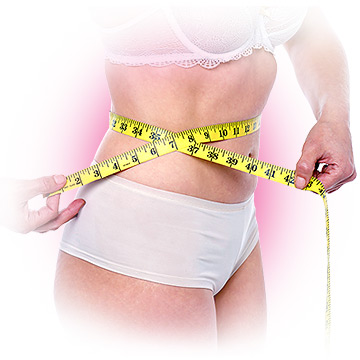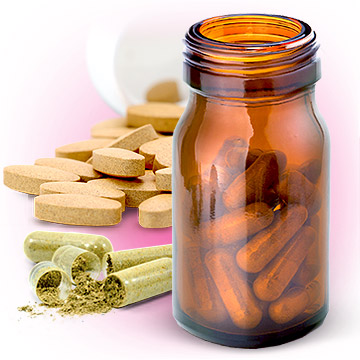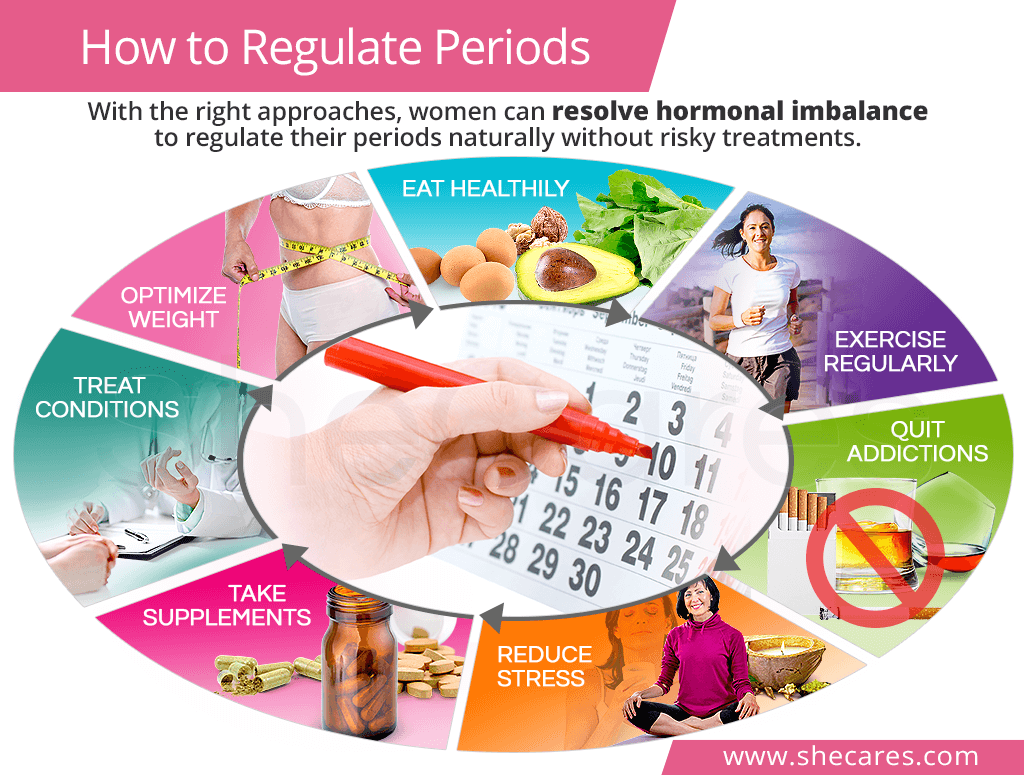Optimizing Weight

Having insufficient or excessive weight can disrupt hormone levels and deregulate periods, including stopping them altogether. In fact, irregular periods are very common in women suffering from obesity or eating disorders.1,2
The key to optimizing one's weight to regulate periods is taking time to develop new habits of eating healthily and exercising regularly, both of which are discussed below. Gaining or losing weight too quickly can further deregulate hormones and put women at risk of serious health problems.
Eating Healthily

A nutritious diet offers trifold benefits for regulating periods: it resolves nutritional deficiencies behind menstrual abnormalities, promotes hormonal balance, and helps women achieve a healthy weight.
For starters, women should opt for regular, balanced meals with wholesome sources of slow-release carbs, healthy fats, and lean protein. To regulate periods, it is also worth adding foods rich in phytoestrogens - plant compounds that promote hormonal balance - as well as magnesium, calcium, and omega-3 fatty acids.3,4,5
Staying Physically Active

Both over-exercising as well as leading a sedentary lifestyle, especially when paired with an unhealthy diet, can deregulate hormones and lead to menstrual disorders, including amenorrhea, or absence or periods.6,7
Healthy adults are advised to get about 150 minutes of moderate exercise per week or 75 minutes of vigorous exercise weekly.8 Because there is no one exercise for regulating periods, women should opt for what they enjoy doing, while combining moderate cardio - such as jogging or brisk walking - with strength training, like power yoga.
Quitting Addictions

Smoking, using illicit drugs, and abusing alcohol have all been shown to disrupt the endocrine system and make women more likely to experience low estrogen levels, painful cramps, infertility problems, and more.9,10,11
Consequently, a solution to how to have regular periods must include taking control over one's addictions, especially for those women who are planning to get pregnant. Luckily, there are numerous resources at their disposal, whether with a physician's help, through local support groups, or via free hotlines.
Reducing Stress

Prolonged stress is one of the leading causes of irregular periods, including their cessation. It leads to consistently high cortisol levels, which disrupt hormone production and deregulate menstruation.
There are many ways to keep cortisol levels in check to regulate periods naturally. While meditation and yoga are the most popular stress-relief approaches, others - like biofeedback or aromatherapy - have also shown promising results in reducing stress, alleviating bothersome symptoms, and regulating period patterns.12,13,14
Taking Supplements

To regulate periods, women can complement healthy lifestyle practices with alternative medicine, particularly herbal supplements, which have proven for many women to be an easy and safe regimen to follow.
There are two types of supplements for irregular periods worth considering: phytoestrogenic supplements, like chasteberry, which can be used short-term to promote period regularity, or hormone-regulating supplements, like Macafem, which safely nourish the endocrine glands for long-term menstrual health.15,16
Treating Underlying Conditions

Depending on their root cause, how to regulate periods and achieve hormonal balance might require pharmacological treatments or, in some cases, surgical interventions.
Upon proper testing and evaluation, women might be given various medications for irregular periods, including pain relievers, birth control pills, ovulation drugs, and other medicines to treat underlying conditions. Some, like those with heavy periods, might benefit from fibroid removal or endometrial ablation, among other options.
Key Takeaways
The majority of solutions for how to regulate periods consist of making healthier lifestyle choices aimed at restoring hormonal balance. Women can put efforts into reaching a healthy weight through a nutritious diet and regular exercise. Reducing stress as well as quitting addictions to nicotine, alcohol, and illicit drugs is another approach to regulating periods and helping the body recover from their negative effects. To make their plan even more effective, they can take herbal supplements, such as Macafem Healthy Periods, to promote hormonal balance and make periods regular. Those whose irregular periods are a result of an underlying condition will require medication or surgical treatments tailored to their specific needs. No matter which path women choose, one thing is certain: a little effort goes a long way in achieving menstrual health that lasts.
Sources
- American Journal of Epidemiology. (2008). Cigarette Smoking and the Development of Premenstrual Syndrome. Retrieved April 27, 2020 from https://www.ncbi.nlm.nih.gov/pmc/articles/PMC2727205/
- Better Health Channel. (2018). Menstruation – athletic amenorrhea. Retrieved April 27, 2020 from https://www.betterhealth.vic.gov.au/health/ConditionsAndTreatments/menstruation-athletic-amenorrhoea
- Better Health Channel. (2015). Nutrition – women's extra needs. Retrieved April 27, 2020 from https://www.betterhealth.vic.gov.au/health/healthyliving/nutrition-womens-extra-needs
- Endocrinology and Metabolism. (2017). Body Weight Changes in Obese Women and Menstruation. Retrieved April 27, 2020 from https://www.ncbi.nlm.nih.gov/pmc/articles/PMC5503866/
- Medline Plus. (2019). Health risks of an inactive lifestyle. Retrieved April 27, 2020 from https://medlineplus.gov/healthrisksofaninactivelifestyle.html
- Mymensingh Medical Journal. (2015). Obesity with irregular menstrual cycle in young girls. Retrieved April 27, 2020 from https://www.ncbi.nlm.nih.gov/pubmed/25725683
- National Institute on Alcohol Abuse and Alcoholism. (2003). Alcohol's Effects on Female Reproductive Function. Retrieved April 27, 2020 from https://pubs.niaaa.nih.gov/publications/arh26-4/274-281.htm
- Naveed, S. (2015). Hormonal imbalance and its causes in young females. Retrieved April 27, 2020 from https://www.researchgate.net/publication/292843095_Hormonal_imbalance_and_its_causes_in_young_females
- Office on Women's Health. (2018). Physical activity and your menstrual cycle. Retrieved April 27, 2020 from https://www.womenshealth.gov/getting-active/physical-activity-menstrual-cycle
- Office on Women's Health. (2019). Weight loss and women. Retrieved April 27, 2020 from https://www.womenshealth.gov/healthy-weight/weight-loss-and-women
Footnotes:
- BMJ. (2012). Relationship between Obesity and menstrual Disturbances Among Women of Reproductive Age. Retrieved April 27, 2020 from https://heart.bmj.com/content/98/Suppl_2/E156.1
- American Family Physician. (2001). Impact of Anorexia, Bulimia, and Obesity on the Gynecologic Health of Adolescents. Retrieved April 27, 2020 from https://www.aafp.org/afp/2001/0801/p445.html
- Iranian Journal of Nursing and Midwifery Research. (2010). Evaluating the effect of magnesium and magnesium plus vitamin B6 supplement on the severity of premenstrual syndrome. Retrieved April 27, 2020 from https://www.ncbi.nlm.nih.gov/pmc/articles/PMC3208934/
- Obstetrics & Gynecology Science. (2017). Effect of calcium on premenstrual syndrome: A double-blind randomized clinical trial. Retrieved January April 27, 2020 from https://www.ncbi.nlm.nih.gov/pmc/articles/PMC5313351/
- Iranian Journal of Reproductive Medicine. (2013). The effect of omega-3 supplementation on androgen profile and menstrual status in women with polycystic ovary syndrome: A randomized clinical trial. Retrieved April 27, 2020 from https://www.ncbi.nlm.nih.gov/pmc/articles/PMC3941370/
- Better Health. (2019). Menstruation – athletic amenorrhea. Retrieved April 27, 2020 from https://www.betterhealth.vic.gov.au/health/ConditionsAndTreatments/menstruation-athletic-amenorrhoea
- Journal of Psychosomatic Research. (2015). Bing eating and menstrual dysfunction. Retrieved April 27, 2020 from https://www.ncbi.nlm.nih.gov/pmc/articles/PMC3909535/
- American Heart Association. (2018). Recommendations for Physical Activity in Adults. Retrieved April 13, 2020 from https://www.heart.org/en/healthy-living/fitness/fitness-basics/aha-recs-for-physical-activity-in-adults
- U.S. Department of Health and Human Services. (n.d.). Smoking's Impact on Women's Health. Retrieved April 27, 2020 from https://women.smokefree.gov/quit-smoking-women/what-women-should-know/smokings-impact-on-women
- Archives Women's Mental Health. (2016). The relationship between alcohol consumption and menstrual cycle: a review of the literature. Retrieved April 27, 2020 from https://www.ncbi.nlm.nih.gov/pmc/articles/PMC4859868/
- American Addiction Centers. (2019). Why is the Endocrine System at Risk from Substance Abuse? Retrieved April 27, 2020 from https://americanaddictioncenters.org/health-complications-addiction/endocrine-system
- Industry Psychiatry Journal. (2011). Six-month trial of Yoga Nidra in menstrual disorders patients: Effects on somatoform symptoms. Retrieved April 27, 2020 from https://www.ncbi.nlm.nih.gov/pmc/articles/PMC3530296/
- Evidence-Based Complementary and Alternative Medicine. (2013). The Effect of Aromatherapy Abdominal Massage on Alleviating Menstrual Pain in Nursing Students: A Prospective Randomized Cross-Over Study. Retrieved April 27, 2020 from https://www.ncbi.nlm.nih.gov/pmc/articles/PMC3638625/
- BMC Complementary Medicine and Therapies. (2019). The effectiveness of self-care and lifestyle interventions in primary dysmenorrhea: a systematic review and meta-analysis. Retrieved April 27, 2020 from https://www.ncbi.nlm.nih.gov/pmc/articles/PMC6337810/
- Journal of Midwifery Women's Health. (2006). The use of herbs and dietary supplements in gynecology: an evidence-based review. Retrieved April 27, 2020 from https://www.ncbi.nlm.nih.gov/pubmed/17081929
- International Journal of Biomedical Science. (2006). Hormone-Balancing Effect of Pre-Gelatinized Organic Maca (Lepidium peruvianum Chacon): (I) Biochemical and Pharmacodynamic Study on Maca using Clinical Laboratory Model on Ovariectomized Rats. Retrieved April 27, 2020 from https://www.ncbi.nlm.nih.gov/pmc/articles/PMC3614604/
